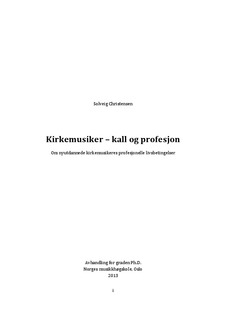Kirkemusiker - kall og profesjon. Om nyutdannede kirkemusikeres profesjonelle livsbetingelser
Doctoral thesis
Permanent lenke
http://hdl.handle.net/11250/172452Utgivelsesdato
2013Metadata
Vis full innførselSamlinger
- NMH-publikasjoner [121]
- Ph.d.-avhandlinger [64]
Sammendrag
The dissertation Church Musician – Calling and Profession focuses on a relatively small professional group in Norway – the cantors. This group is marginal in terms of its size, but the cantor profession has long held a significant position within the church, schools and in everyday cultural life. The Church of Norway is an institution in a state of rapid change, and the professional role of the cantor will soon become a complex one. In the present study I therefore discuss the following research question: What characterises the professional conditions of newly qualified church musicians, and how do these conditions contribute to the candidates’ understanding of their professional role? The education required for cantors is a four-year bachelor degree in Church Music, which is a study path in the conservatoire tradition. The programme in its earliest form was formalised in 1883 at «The Kristiania school for organists» – the precursor to the Norwegian Academy of Music in Oslo (founded in 1973). However, because of reforms and increasing complexity within the church, the traditional study path is challenged by alternative qualifications. The cantor profession seems gradually to be seeking new legitimacy.
This dissertation seeks to illuminate both knowledge-based, institutional and personal conditions of significance for graduate church musicians’ professional understanding. The dissertation concludes that the cantor profession is a very complex ministry, expected to perform a growing range of tasks in the professional field. It is thus questionable whether a study path based on a traditional music conservatoire education (both in form and content) is a meaningful one for future church musicians. The study concludes that some basic questions must be addressed before the Norwegian Academy of Music and other institutions offering church music education can shape future education plans: - What does it mean to prepare musicians for professional life? - Is it possible to satisfactorily combine the separate perspectives of musical discipline and professional needs within the framework of a four-year bachelor degree? If not: - Should church music education primarily be a musical discipline or a vocational preparation?
The project falls under the focus area «Research in and for Higher Music Education» at the Norwegian Academy of Music.
Beskrivelse
Avhandling (Ph.D.) - Norges musikkhøgskole, 2013
